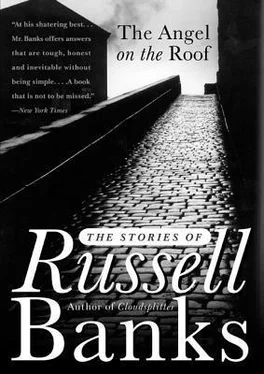Clearly, the structure deserved admiration, and got it, especially from the denizens of the trailerpark, for the contrast between Merle’s bob-house and the cubes they all lived in was notable. As November wore on and Merle completed refurbishing the bob-house, people from the park daily came by and stood and studied it for a while, saying things and probably feelings things they had not said or felt before. Until Merle won the lottery, the people had more or less ignored the old man and his bob-house, but when they started coming around to congratulate him and ask for loans, they noticed the tiny, reddish cabin sitting on its runners a few feet off the lake, noticed it in a way they never had before, for they usually found him working there, and their attention got drawn to his work, and also they were curious as to how he was spending his money, so as to determine whether there would be any left for them. And when they saw the bob-house, really took a close look at its precision and logic and the utter usefulness of every detail, they were often moved in strange ways. It was as if they were deserted on an island together and suddenly had come upon a man among them who was building a seaworthy boat, and it was a boat that could carry no more than a single person off the island. They were moved by the sight of Merle’s bob-house, moved to hate the sight of their own rusting, tin-and-plastic trailers, the cheap, manufactured clutter of their shelters, and this unexpectedly disturbed them. The disturbance moved them, unfortunately, to envy Merle’s bob-house.
“How come you making it so fancy?” Terry Constant sneered.
Merle looked up from the floor where he was screwing down the new two-by-eight-inch plank flooring and saw the black man silhouetted darkly against a milk-white sky so that his features couldn’t be seen. He wore an orange parka and Navy watch cap and was chewing a toothpick. Merle said nothing and went back to work.
“You win the numbers, like they said?”
“Yup.”
“That’s how come you’re making it so fancy, then.”
“…”
“Luxury!”
“…”
“Who’s gonna see it, a little fish house? I coulda slapped this thing together in half the time for half the cost outa plywood.”
“…”
“This thing’ll last longer’n you will. You realize that? You’ll be dead a hundred years, and this thing’ll still be sitting here by the lake.”
Merle picked up a new plank and with a stubby plane shaved blond, sweet-smelling curls off the wood. He lay the board against the first, cast his gaze down its length, retrieved it, and gave it another half dozen smooth strokes of the plane, until finally the plank fit snugly, perfectly, into place.
“Well, it looks good, anyhow,” Terry said. He shifted his toothpick and, placing one foot onto the high sill, dropped his right forearm onto his thigh and leaned forward and into the close, dim, resin-smelling interior of the bob-house. “Say, Merle, I was wondering, see, I’m outa work. Marcelle’s all done winterizing the park, so she don’t need me anymore until spring or unless the pipes burst or something, and there ain’t no work in this damn town in winter, especially for a black man. So I was wondering if you could help me out a little, till I could get some more work.”
“Sure.”
“I was thinking of maybe heading south this winter, getting some work in Florida. I got a cousin in Tampa, but it’ll take some bucks to do it. You know, for bus fare and after I get there, till I get a job.”
“What about your sister?” Merle asked without looking up. “She’d be pretty much alone here without you. Being colored and all. Come spring, you could get work again, maybe for the highway department or something. You don’t want to leave her all alone up here.”
“Well, yeah…” Terry let his glance fall across the oak framing of the structure, noticing for the first time how it had been notched and fitted together with pegs. “But I can’t take any more handouts from her. Maybe you could loan me enough to get me through the next three or four months,” he said. “I got problems, man.”
“How much?”
“Five, six hundred, maybe?”
“Sure.”
“Seven would be better.”
“Sure.”
“I’ll pay you back.” He stood up straight again and stepped away from the door as Merle got slowly to his feet and came out to the yard.
“Sure,” he said. “Money’s in the house.”
“Okay,” Terry said almost in a whisper, and the two men crossed the yard to the trailer.
There were other loans: Bruce Severance, the long-haired kid in number 3 who sold dope, needed $300 fast, to get a very heavy dude off his back, he said; Noni Hubner, the college girl in number 7, was recuperating from her first nervous breakdown and wanted to do what her mother had so far refused to do, buy a proper gravestone for her father’s grave, which, since his death two years ago, had gone unmarked; and Leon LaRoche, the bank teller in number 2, said he needed money to help pay his sick mother’s hospital bills, but it came out (only as a rumor, however) that his mother was not ill and that he was spending money recklessly to support a young man supposedly going to college in Boston and whom Leon visited almost every weekend; and Claudel Bing, who was no longer living at the trailerpark but still had friends there, and after having lost his job at the Public Service Company, said he needed money to pay for his divorce from Ginnie, who was living with Howie Leeke; Tom Smith was dead by then, but his son, Buddy, somehow heard about Merle’s good luck and wrote from Albany asking Merle for $500 so he could pay off the debts he claimed his father’s burial had left him with, and Merle mailed the money to him the next day; Nancy Hubner, Noni’s mother, insisting that she did not want the money for herself, explained that she had got herself into an embarrassing situation by pledging $1,000 to the Clamshell Alliance antinuclear people and had only been able to raise $750; Captain Dewey Knox, in trailer number 6, who certainly seemed affluent enough not to need any of Merle’s money, suddenly turned out to owe three years’ back taxes on the last bit of land his father had owned in Catamount, a rocky, hundred-acre plot on the northern edge of what had been the elder Knox’s dairy farm, and to keep the Captain from losing that last connection to his sanctified past, Merle loaned him $638.44; and then, finally, there was Marcelle Chagnon, the manager of the trailerpark, living in number 1, and needing money to protect her job, because the Granite State Realty Development Corporation was billing her personally for the cost of replacing all the frozen pipes in trailer number 11, then vacant, which Marcelle had neglected to drain last August when the previous tenants, a pair of plasterers from Massachusetts working on a new motel over in Epsom, had left. And then, well — then all the money was gone.
* * *
By mid-November, the sun was setting early and rising late, and the daily temperatures rarely got above freezing, the nights often falling to zero and below. Except for where the water rushed across the weirs, the lake was frozen over entirely. The bob-house was ready, and Merle’s tipups, lines, jigs, and chisels were repaired, cleaned, oiled, and packed neatly into the bob-house. First thing every morning, Merle pulled on his cap and mackinaw and trotted from his trailer down to the shore to read the ice. It was going to be a good winter for ice — no snow so far, very little wind, and lots of steady, unbroken cold. A Canadian high had moved southeast in late October and hunkered over northern New England for two weeks straight, so that, with clear nighttime skies, the ice had formed, spread, and thickened several weeks ahead of schedule.
Читать дальше












